
Demeter
A sweeping look at Demeter’s evolution from earth-mother to goddess of agriculture, this excerpt traces her central role in Greek myth, from the abduction of Persephone to the origins of the Eleusinian Mysteries, revealing how ancient storytellers used her tale to explain the seasons, civilization, and the promise of rebirth.
Jupiter Determines to Destroy the World
The gods look down and find the world rank with blood and treachery, its cities swollen with crime and pride. In Ovid’s telling, Jupiter’s decision to unmake humanity is not a stormy act of wrath, but a cold recalibration—a divine flood issued not from fury, but from disgust.
Prometheus and Pandora
In Jean Lang’s vivid retelling, Prometheus and Pandora becomes not just a myth of origin but a meditation on rebellion, punishment, and the perilous beauty of human curiosity. With lyrical prose and moral weight, Lang traces the fall from innocence not as a lapse, but as an awakening—where fire, suffering, and even hope are gifts costly enough to shape civilization itself.
Pyramus and Thisbe
Josephine Preston Peabody offers a tender retelling of antiquity’s most tragic miscommunication, an elegy of young love undone not by cruelty but by mistiming, veils, and the mute indifference of nature. Babylon becomes the unlikely stage for a proto-Romeo and Juliet, where even the mulberry tree bleeds red with grief.
The Model for All the Sirens of the Centuries: Helen of Troy
In Albert Payson Terhune’s rollicking retelling, Helen becomes not just the face that launched a thousand ships, but a living embodiment of male fantasy and female peril, part goddess, part scapegoat, ageless and irresistible. Told with brash charm and arch wit, her legend is reassembled as both moral fable and cautionary tabloid.
















